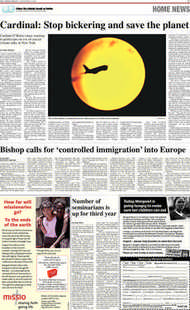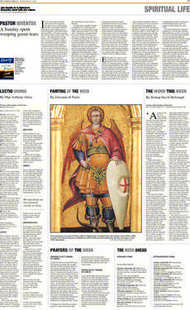Page 6, 25th September 2009
Page 6

Report an error
Noticed an error on this page?If you've noticed an error in this article please click here to report it.
Tags
Share
Related articles
Honduran Bishop Wins Campaign Against Mining
`contras Murdered Fr Arsenault' Honduran Bishop Claims
Wealthy Elite Ousted President, Says Honduran Bishop
Honduras Bishops Drop Harassment Plea
`leave Us In Peace' Nicaraguan Bishop Pleads To Insurgents
Bishop: Honduras may face civil war
BY PAUL JEFFREY
A HONDURAN bishop has said his country could face civil war unless dialogue is opened up between the de facto government and its opponents.
Bishop Luis Santos Villeda of Santa Rosa de Copan said he would try to start negotiations between “the Resistance” — Hondurans who oppose the de facto government installed in the coup in June – “and the economically powerful who are behind the coup”.
He said: “Dialogue many times seems impossible at the beginning, but as things get clarified the parties come to accept it.
“And attempting to open a dialogue is strategically important at this point, because if the armed forces and the police continue killing the people of the Resistance – they’ve already killed eight – and breaking their arms with batons, this could provoke widespread resentment that could evolve into a civil war.” Bishop Santos has joined two protests against the government. On September 12 he celebrated Mass with eight other priests during a demonstration in the streets of Santa Barbara and the follow ing day he and six other priests celebrated Mass during a demonstration in La Esperanza.
Yet the bishop told the American Catholic News Service that he was not a member of the Resistance.
“It’s the people who are in the Resistance, not me. My task is to provide pastoral accompaniment, encouraging them spiritually to love God and their neighbour. My message is that faith in Jesus Christ and the love of God are necessary to confront the social injustice that reigns in Honduras and which has become more visible with the coup d’etat.” The bishop said elections scheduled by the government for November 29 were likely to aggravate the situation.
“Those in the Resistance don’t want elections if [deposed President] José Manuel Zelaya Rosales doesn’t return to the country. So there will be resistance to voting, and since the armed forces and police will be in charge of the elections, I suspect there will be violence between the Resistance and the armed forces,” he said.
As The Catholic Herald went to press it emerged that the ousted president, Mr Zelaya, had returned to Honduras for the first time since being flown in his pajamas to Costa Rica during the coup. A strict curfew has since been imposed on the country.
Bishop Santos said he had spoken by telephone with Mr Zelaya, who had accepted the mediation effort. But he said he had not yet contacted Roberto Micheletti, the de facto president, “since he’s very astute and would surely make videos to present me in public as favouring him and the coup. I don’t want to fall into that trap.” Bishop Santos said another agenda item for any dialogue should be planning a national constituent assembly that would consider rewriting parts of the country’s constitution. “The present constitution was created by the economic elite of the country, and for 27 years the two political parties have been incapable of resolving the basic problem of Honduras, which is social injustice. We’re one of the worst countries in Latin America in terms of inequality. Nor have they resolved the lack of education or healthcare for the poor,” he said.
Bishop Santos’s perspective is different from that of Cardinal Oscar Rodriguez Maradiaga of Tegucigalpa, who has defended the coup as a legitimate measure to derail an unconstitutional power grab by Mr Zelaya. Bishop Santos said he had not spoken to the cardinal since the country’s bishops met in the wake of the coup. “It’s difficult to speak with the cardinal,” he said, citing Cardinal Rodriguez’s obligations.
The Micheletti government faces growing grassroots opposition and increased international pressure. The US government has terminated more than $30 million in nonhumanitarian aid, cancelled the visas of Mr Micheletti, several cabinet ministers, judges and Honduran business leaders, and announced it will not recognise elections carried out by the de facto regime. Last week the European Union said it would levy stronger sanctions if Mr Zelaya was not allowed to return. Bishop Santos applauded the moves, but said the American government was sending mixed messages about its response to the crisis.
“President [Barack] Obama and [Secretary of State] Hillary Clinton have a point of view, but the Central Intelligence Agency and the Pentagon have a contrary point of view,” he said. “The coup was carried out with the knowledge of the US government, because it wasn’t convenient for them to let [Venezuelan President] Hugo Chávez or anyone else have any power in Honduras. But the civilians in the government can’t accept a coup, so there’s a dialectic at play that we hope will resolve itself.”
blog comments powered by Disqus





















